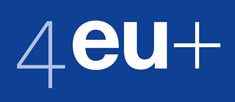Student representation and social accountability
The University of Copenhagen (UCPH) and the Student Council at UCPH hosted a 4EU+ student conference in October. 35 students from the six universities in the 4EU+ alliance met to discuss student representation on the alliance’s committees and the students’ visions for the 4EU+ alliance. The result of the conference is 27 recommendations ranging from equal gender balance to social and environmental accountability, which have been given to the steering committee.
Equal gender representation on committees and working groups, free mobility between the six universities with focus on the environmental impact of mobility, securing housing for students on exchange and student rights. The list of recommendations is not only ambitious, but also an expression of this generation’s student voices across Europe. The conference had two themes: 1) how should students be represented in the 4EU+ alliance, 2) and what is the students’ vision for the alliance?

Opportunities and student agendas
The UCPH Student Council acted as conference co-host and workshop facilitator throughout the conference to ensure that the recommendations produced in the two days represented the student outlook on the 4EU+ alliance. On the agenda was a discussion on how the students of the six universities see themselves represented in the alliance governance model.
All conference participants agreed that they would like to be represented in the 4EU+ management bodies: 1) the Steering Committee, which manages and coordinates the alliance’s work; 2) the Management Team, which consists of the rectors from the six universities; 3) the alliance’s future academic council; and 4) the two working groups for education and mobility.
Furthermore, the students intend to set up a student committee to coordinate the student representatives’ work on the four committees and the two working groups. The overall result of the conference is a list of 27 recommendations, which will now be submitted to the 4EU+ steering committee.
The conference participants were all members of their universities’ student bodies and had been appointed by their respective home universities to represent their university and its students. The 35 students represented all levels of higher education, with both undergraduates, master’s and PhD students. The two-day conference was an opportunity for the 35 students to voice how they see students’ role in the 4EU+ alliance and what subjects and challenges the 4EU+ alliance should address.
An alliance with more than education
The 35 students who attended the conference also discussed the vision for the 4EU+ alliance from a student perspective. While the students came from six different countries and cultures, they could all agree that the values to drive this alliance forward are sustainability, humanitarianism and accessibility.
Through these values, the student representatives will address the subjects and challenges that concern students across Europe. The student participants believe that the universities and the 4EU+ alliance have a responsibility to be a leading figure in moving the European identity and society forward. To ensure this, it is important that the 4EU+ alliance not only understands itself in relation to educational challenges but also understands itself in a broader societal perspective - as UCPH student Mike Guldbergsen explained after the conference:
“This is a great opportunity for six different universities across the continent, and across the EU, to get together and really dig in to the issues we have in common (across the continent and EU)”
Overall, it was two very productive conference days that showed that students across Europe, and indeed across the six universities, are able and willing to participate and ensure that the 4EU+ alliance moves ahead towards a European vision of deepened cooperation and mutual enrichment.
By Kristian Petersen and Aske Stick
Hear the students expectations of 4EU+
About 4EU+

4EU+ was founded in March 2017 and initially consisted of Charles University (Czech Republic), Heidelberg University (Germany), Sorbonne University (France) and University of Warsaw (Poland). The University of Copenhagen (Denmark) and University of Milan (Italy) were invited to join and admitted in the autumn of 2018.

The 4EU+ Alliance
Read more about the 4EU+ Alliance here.
